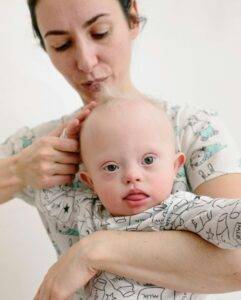Welcoming a new baby into your family is an exciting and sometimes overwhelming experience. The first weeks and months are filled with discovery, bonding, and adjusting to a new routine. When you have a newborn baby with Down syndrome, the experience comes with additional layers of emotion and questions.
Understanding what to expect and how to support your newborn makes this time joyful and fulfilling. This guide will help you navigate the early days and months with your newborn, addressing health concerns, developmental milestones, and the support systems available to your family.
What is Down Syndrome?
Down syndrome is a genetic condition caused by an extra copy of chromosome 21, also known as Trisomy 21. This genetic material affects a baby’s physical and intellectual development. The condition is the most common chromosomal disorder, occurring in about 1 in every 700 births.
Babies with Down syndrome have distinct facial features, such as a flat facial profile, upward-slanting eyes, and a small nose. Each baby is unique, and the degree to which Down syndrome affects a child varies widely.
Variations of Down Syndrome
There are three types of Down syndrome: Trisomy 21, Mosaic Down syndrome, and Translocation Down syndrome.
- Trisomy 21: The most common form, where every cell in the body has three copies of chromosome 21 instead of two.
- Mosaic Down Syndrome: This type is less common, and it occurs when some cells in the body have three copies of chromosome 21, while others have the typical two copies. Children in this category have fewer symptoms than those with Trisomy 21.
- Translocation Down Syndrome: This happens when an extra part of chromosome 21 is attached to another chromosome. This can be inherited, unlike the other forms, which typically occur as random events during the formation of reproductive cells.
Understanding the type of Down syndrome your baby has helps you better anticipate their needs and the challenges they might face. A diagnosis doesn’t define your child’s potential. With the right support, children with Down syndrome lead fulfilling, happy lives.
Health Concerns of Newborn Baby with Down Syndrome
Heart Defects
Approximately 40–60% of babies with Down syndrome are born with congenital heart defects, ranging from minor issues that may be resolved to more significant problems that require surgery. Common heart defects include atrioventricular septal defect (AVSD), ventricular septal defect (VSD), and patent ductus arteriosus (PDA).
Early diagnosis through prenatal screenings or neonatal echocardiograms allows for timely intervention and management. Work closely with a pediatric cardiologist to monitor your baby’s heart health and ensure they receive the best care possible.
Respiratory and Hearing Concerns
Due to smaller nasal passages and airways, the babies are prone to respiratory infections and obstructive sleep apnea. Keep your baby’s airway clear and monitor for respiratory distress, such as rapid breathing or bluish skin.
Hearing issues are also prevalent, with many babies experiencing conductive hearing loss due to fluid in the middle ear, or sensorineural hearing loss, affecting the inner ear or auditory nerve. Regular hearing tests are essential to catch any problems early.
If your baby is diagnosed with hearing loss, options such as hearing aids or other assistive devices help them develop their communication skills effectively.
Vision and Thyroid Issues
The babies are at a higher risk for vision problems, including cataracts, strabismus (crossed eyes), and refractive errors like nearsightedness or farsightedness. Regular eye exams ensure issues are identified and treated early. Glasses or corrective surgery may be needed, depending on the specific condition.
Another common issue is hypothyroidism, where the thyroid gland doesn’t produce enough thyroid hormone. This affects growth, metabolism, and overall development. A simple blood test diagnoses hypothyroidism, and it’s treated with medication. Early detection and treatment of thyroid issues support your baby’s growth and development.
Developmental Milestones: What to Expect
Physical Development and Motor Skills
Babies with Down syndrome have low muscle tone, a condition known as hypotonia, affecting their motor skills. You notice your baby takes longer to achieve certain physical milestones, such as holding their head, rolling over, sitting up, and walking. Despite these delays, many children reach these milestones with the help of early intervention.
Physical therapy helps your baby develop muscle strength and coordination. Exercises tailored to your baby’s needs improve their ability to move and interact with their environment. For instance, tummy time, which involves placing your baby on their stomach while awake and supervised, strengthens neck and shoulder muscles.
Celebrate each milestone your baby reaches, no matter when it occurs. Progress may come at a different pace than other children, but with patience and support, your baby will continue to grow and learn.
Cognitive and Language Development
Cognitive development in babies with Down syndrome varies, and while they face intellectual challenges, many children learn and develop new skills with the right support. Early intervention programs on cognitive development help your baby build foundational skills such as problem-solving, attention, and memory.
Language development might also be delayed, but this doesn’t mean your baby can’t communicate. Many babies with Down syndrome use gestures, facial expressions, and sounds to express their needs and feelings before they start talking. Speech therapy, introduced early, is beneficial in helping your baby develop verbal communication skills.
Social and Emotional Growth
Babies with Down syndrome are affectionate and enjoy social interactions. They desire to connect with others, nurtured through regular interaction with family members and peers. Participating in playgroups, attending family gatherings, and exposing your baby to different social environments help them develop social skills.
Emotionally, children with Down syndrome experience a range of feelings just like any other child. They sometimes feel frustrated or overwhelmed, especially when they struggle with communication or physical tasks. Understanding their emotional needs and providing a supportive, nurturing environment will help them thrive.
Early Intervention: A Path to Success
Why Early Intervention Matters
Early intervention is a program of services designed to help infants and toddlers with developmental delays or disabilities. For babies with Down syndrome, early intervention is crucial because it addresses developmental delays as soon as possible, giving your child the best start in life.
These services include physical therapy, speech therapy, and occupational therapy. Each type targets different areas of development. For example, physical therapy helps with motor skills and muscle strength, while occupational therapy focuses on fine motor skills, such as grasping and manipulating objects.
The earlier your baby begins receiving these services, the more progress they’re likely to make. Early intervention also provides you, as parents, with strategies and techniques to support your child’s development at home.
Building a Support Network
Navigating the world of early intervention can be challenging, especially when managing the day-to-day responsibilities of caring for a newborn. Building a strong support network makes a difference. This network includes healthcare professionals, such as your pediatrician, cardiologist, or audiologist, and therapists.
In addition to professional support, connecting with other parents of children with Down syndrome is incredibly helpful. Support groups, in-person and online, offer a space to share experiences, ask questions, and gain reassurance from those who understand what you’re going through.
Organizations like the National Down Syndrome Society (NDSS) and local Down syndrome associations are excellent resources for finding support groups and other services in your area. Many of these organizations also offer educational materials, advocacy support, and community events to help you stay informed and connected.
Embracing the Journey with Newborn Baby with Down Syndrome
Celebrate Every Milestone
Raising a child with Down syndrome is a journey filled with unique challenges and joys. Recognize and celebrate every achievement, no matter how small it may seem. Each milestone your baby reaches is a testament to their hard work and determination, as well as your dedication as a parent.
In the early months, these milestones include the first smile, rolling over, or sitting up. As your child grows, there will be other significant achievements, such as taking their first steps, saying their first words, or starting school.
Build Strong Family Relationships
Having a child with Down syndrome strengthens family bonds. Siblings develop a deep sense of empathy and responsibility, learning valuable life lessons from their brother or sister. As parents, you have new levels of patience, resilience, and understanding as you navigate the challenges and rewards of raising a child with special needs.
Open communication within the family is crucial. Encourage siblings to express their feelings and ask questions about Down syndrome. Create an environment where everyone feels heard and supported to maintain a healthy family dynamic.
Make time for activities that bring joy and relaxation to the whole family. Whether going for a walk, playing a game, or simply spending time together, these moments of connection and bonding are essential for maintaining a strong family unit.
Face Challenges with Resilience
While the journey of raising a child with Down syndrome is filled with many rewarding moments, it’s also natural to encounter challenges along the way. These challenges range from managing health issues to addressing developmental delays and navigating the educational system.
One of the most significant challenges is the uncertainty about the future. Parents often wonder how their child will develop, what their needs will be, and how they will be able to support them as they grow. While it’s impossible to predict everything, focusing on the present and taking things one step at a time can help you manage these concerns.
You don’t have to go through this alone. Seek advice from professionals, connect with other parents, and lean on your support network whenever you need to. Each challenge you face and overcome will build your confidence and strengthen your ability to advocate for your child.
Long-Term Outlook for Newborn Baby with Down Syndrome
Education and Learning Opportunities
As your child with Down syndrome grows, their educational needs will become an important focus. Children with Down syndrome are entitled to a free and appropriate public education (FAPE) under the Individuals with Disabilities Education Act (IDEA)..
Many children with Down syndrome benefit from inclusive education, learning alongside their peers in a general education classroom. Inclusion can provide social benefits, such as forming friendships, developing social skills, and academic advantages.
Preparing for Independent Living and Adulthood
With the right support, many adults with Down syndrome can lead independent and fulfilling lives. As your child grows, preparing for adulthood will become increasingly important. This preparation includes teaching life skills, such as personal care, cooking, managing money, and using public transportation.
Career training programs are also valuable resources for preparing young adults with Down syndrome for employment. These programs often offer job coaching, internships, and other opportunities that help individuals gain the skills and experience needed to succeed in the workforce.
Health and Wellness in Adulthood
Thanks to advances in medical care and early intervention, people with Down syndrome are living longer, healthier lives than ever before. However, they may face certain health challenges as they age, including an increased risk for conditions such as obesity, sleep apnea, thyroid disorders, and Alzheimer’s disease.
Regular medical check-ups, a healthy diet, regular physical activity, and ongoing monitoring of any existing health conditions are important for maintaining your child’s health as they grow into adulthood.
Embrace the Journey with Love and Confidence
Raising a newborn baby with Down syndrome is unique and deeply rewarding. While there are challenges along the way, there will also be countless moments of joy, love, and pride as you watch your child grow and thrive.
By staying informed, seeking support, and approaching each day with a positive mindset, you help your child reach their full potential and ensure your family enjoys a fulfilling, happy life together. You aren’t alone on this journey.
Many resources and support networks are available to help you navigate the challenges and celebrate the triumphs of raising a child with Down syndrome. You can explore Omega Pediatrics’ blog and other trusted sources. Check out these articles on related topics:
- How Often Should You Take Your Newborn to the Pediatrician in the First Year?
- Finding the Best Newborn Baby Care Near Me: A Parent’s Guide
With love, determination, and the right support, you and your child can embrace this journey with high hopes.








